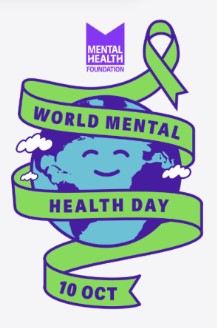World Mental Health Day 2024 – An interview with Dr. Ana Hategan
World Mental Health Day 2024 – Dr. Ana Hategan
World Mental Health Day, observed on October 10th, is a time to reflect and raise awareness of the importance of mental health and the need for greater awareness, understanding, and support. Mental health affects every aspect of our lives, yet many people continue to face challenges in accessing care and navigating stigma. This day serves as a reminder that mental well-being is just as vital as physical health, encouraging us all to prioritize self-care, seek help when needed, and work toward building a society where mental health is valued and supported.

In honour of this day, PEACH Health Ontario is spotlighting three psychiatrists and their invaluable contributions to mental health care. Through this article, we highlight the dedication of these professionals who provide care and advocate for systemic changes to improve mental health services. By sharing their stories and insights, we aim to recognize their impact and inspire further conversations about the importance of mental health in healthcare
To start, we are showcasing Dr. Ana Hategan. Learn more about her work, perspectives on mental health care, and sustainable healthcare:
Q1. Can you introduce yourself and tell me a bit about your background? What inspired you to choose your profession? What need is most in demand right now and where your profession trajectory is headed?
Hello, everyone! I am Dr. Ana Hategan, MD, FRCPC. I am a geriatric psychiatrist and clinical professor in the Department of Psychiatry and Behavioral Neurosciences at McMaster University, in Hamilton, Ontario, Canada. My academic interests have been in sustainable healthcare, physician wellness, and medical education. When I was a resident physician, I found myself enjoying the comfort of working with older adult patients and their families. That likely stemmed from positive experiences caring for older adults prior to my medical school and followed by the presence of great role models and exposure to clinical rotations during my residency training that enhanced my comfort in working with older adults. I have continued to enjoy a stimulating and rewarding work life that has provided meaningful connections to older adult patients and families while performing a valuable and highly needed service. Today, people both work and live much longer. According to the World Health Organization, by 2030, one in six people in the world will be aged 60 years or over. By 2050, the world population over the age of 60 is expected to double and reach two billion. While the shift in the population aging initially started in high-income countries, a rapid growth of older adults will now occur in low- and middle-income countries (with two-thirds of the world’s population over 60 years expected to be living in those countries by 2050). This will have significant consequences for those with vulnerable economies.
As a mental health professional, I believe in disease prevention and promotion of healthy aging in all its aspects as an important role for all societies. But what is healthy aging? Longer lifespans are one of humanity’s greatest achievements. However, we do not just desire to compute more years to our lives; we all aspire to enjoy good health and wellbeing in later life. Nevertheless, many individuals live a long and healthy life without any mental health problems, despite the all too prevalent myth of older adults being “normally” sad, forgetful, or slowed down. And so, mental health problems are not an inevitable consequence of aging. Yet, approximately 14% of adults aged 60 or over live with a psychiatric disorder, with the most common being depressive and anxiety disorders. Biological changes of aging may interfere with the brain’s functioning, social changes can lead to isolation or worthlessness, and systemic medical conditions are also often important contributors to mental health. Conversely, psychiatric disorders in old age may exacerbate the symptoms and functional disabilities associated with systemic medical illnesses and heighten the utilization of already scarce healthcare resources, length of hospital stay, and overall care expenditures. Therefore, one of the possible negative consequences of the rapid aging of the global population is not only the increase in the number of individuals with psychiatric disorders, but also the overwhelming burden on the global mental health systems to care for them. Unavoidably, it will be difficult for nations around the globe, no matter what their respective income levels are, to develop and sustain a specific workforce to treat and care for individuals with psychiatric disorders at the same rate that its older adult group is growing. Despite increasing demand for mental health services for older adults, there are not enough psychiatrists, especially geriatric psychiatrists, to serve their needs. In this vein, fostering collaboration between mental health professionals and primary care teams is absolutely crucial to meet these needs. Evidence-based collaborative care models for major neurocognitive disorder (or dementia), depressive and anxiety disorders, and other psychiatric illnesses have been developed in some Western countries and can serve as a basis for the discussion of innovative approaches to be implemented in the primary care system world-wide by linking primary, secondary, and even tertiary healthcare services, as necessary.
I am a strong believer of the people aging in place within their own homes and communities. Recent research has shown that nearly all older adult Canadians would prefer to age in place, if given the choice. Core healthcare approaches need to centre on the values of respect for patient autonomy, reduction of suffering (both in anticipation of loss of capacity and after), and access to palliative and end-of-life care. A key aspect of such approach to care of the various psychiatric conditions (e.g., dementia, depressive and other psychiatric disorders) can enhance quality of life. It would be interesting to witness the future artificial intelligence technologies and innovations that will support and enhance aging in place. In summary, fascinating brain science coupled with modern technology, a shortage of psychiatrists, and changes in healthcare systems are creating exciting opportunities in the field. I have never regretted my career choice and I am more excited about the future than ever.
Q2. How can individuals and communities contribute to fostering a more supportive mental health environment, especially in an increasingly stressful and fast-paced world?
The balance between the individual’s resilience and vulnerability is key to mental health promotion. For the reasons I mentioned previously, there should be a shifting focus to the aging that will have profound consequences for the sustainability of workforce, healthcare systems, and society in general, and will require more optimal strategies to meet the needs for good mental health and wellbeing in the growing older segment of the population. Groups with specific burdens (e.g., older women) face even a greater risk of poorer mental health that increases their vulnerability, both as informal caregivers and individuals who may suffer from mental health problems. Policies to support them and interventions to prevent isolation and psychiatric disorders must be supported in their communities.
We know that unsupportive environments can prevent us from maximizing our later years. The WHO is urgently calling for action to not only strengthen but transform the way countries provide care and support for older adults. This is especially as we approach the halfway point of the UN “Decade of Healthy Ageing” (2021-2030). The “Decade” is a collaboration of sectors and stakeholders that focuses on changing how we analyze and take action towards many aspects including combating ageism, creating age-friendly environments, designing integrated and responsive healthcare systems so that we can better manage chronic illnesses, maintain mental and physical capacity, and prevent care dependency, and ensuring access to long-term care for older adults who need it in order to live with dignity and purpose.
As for communities, they can teach valuable coping skills and resilience-building techniques through empowering individuals to navigate life’s stressors more effectively. For example, social activities can include organized fun and engaging events that promote relaxation and mindfulness, such as meditation workshops, yoga and mindfulness classes, and art therapy sessions. Physical activity has also a profound impact on mental wellness. As such, community sports events (e.g., walks, runs) can encourage regular exercise and physical activity. Access to social support is essential to reducing stress. This can take various forms, including companionship, emotional support, and practical guidance and assistance. Nature is our home! Supportive natural environments for mental health (e.g., parks, green spaces, forests) have been found to enhance psychological wellbeing and reduce stress. So, access to natural surroundings is essential because they can promote a sense of calmness and relaxation. Therefore, communities that provide opportunities to socialize with other people, share knowledge, provide purpose and accountability, access to green spaces, add learning opportunities, and deliver a social and psychological safety net, are most likely to succeed in promoting mental health awareness and a healthy community.
Q3. For organizations like PEACH Health Ontario, which focuses on sustainable healthcare, how can promoting mental wellbeing contribute to a more resilient healthcare system?
In today’s fast-paced and demanding world, prioritizing wellbeing and mental health cannot be emphasized enough. For a sustainable system to work, healthcare institutions know that they must support their employees; this will ensures their wellbeing and the efficient functioning of essential medical services, with far-reaching positive consequences throughout society, including cost efficiency.
However, mental health education should extend beyond clinical settings to workplaces, communities, schools, and homes. This comprehensive approach serves to dismantle the stigma around mental health, no longer a taboo topic. It equips individuals with the tools to support themselves and others to recognize emotional distress, to seek assistance without fear of judgment or bias, and enabling early intervention. Well-informed individuals are more likely to help family, friends, and peers in need.
Then again, how do we know we live in a healthy and sustainable community? Such community encourages physical activity, provides accessible and affordable healthcare, creates a safe and clean environment, supports social connections, invests in education, and promotes healthy lifestyle behaviours. Organizations such as PEACH Health Ontario (a group that I am a member of) are going the extra mile to support education and taking action in that regard. They emphasize that, beyond doing everything we can to cut greenhouse emissions and slow the pace of global warming, we must become psychologically resilient so we can gear up for big changes and learn how to best protect ourselves and our communities while adapting to climate consequences.
Mental health matters. On this year’s World Mental Health Day, I wish everyone on planet Earth good mental resilience, inner harmony, and emotional fitness! We’re all in this together!
—————————————————————————————————————————————————
Check out our website for additional profiles about psychiatrists for World Mental Health Day!
Education
